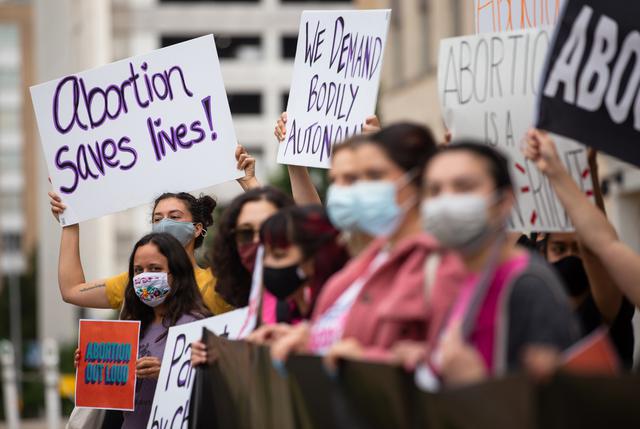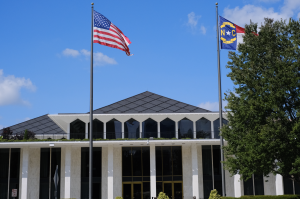Abortion Bill imposes limit on women’s rights
Texas’ Senate 8 Bill highlights a misplaced focus on restrictions, not solutions
October 14, 2021
Texas is a battleground. Billboards with baby photos, captions of Bible verses and phrases like “Don’t I deserve to live?” mark Texas highways. They stand out and grab attention. Oftentimes, crowds gather around churches and clinics, fighting over the life of an unborn fetus.
As a woman growing up in Texas, I was quickly exposed to the realities of abortion and what my body constituted in the eyes of the Texas Legislature. In time I realized that the public discussion of women’s bodies was almost considered shameful. In smaller, rural communities, the woman’s bodily autonomy was entirely left out of the discussion regarding abortion rights.
I remember going to church and watching a panel of white men discuss how we should fight for the lives of the unborn in women’s uteruses. Their argument was that it was shameful for women to stand up and advocate for their independence. “Shouldn’t people want children?” they asked. It was unnatural to disagree.
Today, abortion rights remain a heated topic in the South, and where you stand seems to dictate your morality as a human being. Texas’ division between pro-life and pro-choice advocates has always been great, but with the passing of the “Heartbeat Act” or Texas Senate 8, the divide has hit an inflection point.
The Texas Senate 8 bill, made effective Sept., has become one of the strictest abortion bans in the country.
The bill bans abortions past six weeks of pregnancy, and possibly even earlier if there’s a detected heartbeat. There are no exceptions for cases of rape or incest—six weeks is the limit.
What makes Senate 8 even more different? Senate 8 permits civil citizens to enforce the abortion ban, enabling them to sue and bring any cases to the state for prosecution. Alongside that, each individual will be rewarded up to 10,000 per each verified abortion report. The bill states that persecution may not only pertain to the medical professional performing the procedure but any individuals that “knowingly engage in the performance or inducement of an abortion.”
What Texas has established is essentially a game of tattletale. Whoever exposes or sends an individual in will be rewarded. Theoretically, a neighbor, spouse, friend or family member could turn in another individual based on their medical decision and receive monetary rewards from the state.
I see Texas’s Senate 8 Bill as problematic. First and foremost, because the six-week limit is incredibly unrealistic. Often, women do not know that they are pregnant until during or after the six-week mark. This six-week limit does not give people enough time.
In addition, whether an individual knows if they are pregnant can vary based on an irregular menstrual cycle, unplanned pregnancy or lack of sex education.
The bill creates uncertainty and raises the risk of unsafe abortions. The bill most notably impacts low-income communities and communities of color that predominantly rely on services like Planned Parenthood. It furthers this socio-economic divide of privilege. Those who can afford the price of black market abortions or have the flexibility to travel outside of the state will receive reproductive medical care. In contrast, people who do not have the privilege of time will not receive this care and might seek less safe medical alternatives. Overall, it takes away the individual’s right to make medical decisions.
Texas’ history with challenging reproductive rights isn’t new. For years, it’s been a battle over restrictions and accessibility between the pro-life and pro-choice movements. The anti-abortion movement is harmful because it restricts an individual’s autonomy and negatively impacts how we view women and what makes their bodies their own.
If we take away an individual’s right, what does that say about how we view people and their choice? If we take away a woman’s choice, does that mean her body is indifferent and someone’s property?
Face it, Greg Abbott. Abortions have been happening for years and won’t be stopping anytime soon. They began centuries ago with herbal abortifacients and healers, and have continued in the form of 21st-century doctors.
As a Texan, I have heard the viewpoints of the opposing sides. Both sides are fighting for agency — one for the agency of a fetus, and the other for the agency to maintain an individual’s way of life and autonomy through healthcare and reproductive planning.
Texas is a battleground, not only regarding abortion but migration, racism and equality. As a Texan, I’m proud of our individuality, but not the legislature and Senate 8 Bill. If Texas wants to advocate for life, it should back and support all life. The life of migrants, the life in lower-income communities and those on welfare/food stamps. Senate 8 not only violates an individual’s agency but further expands a division, highlighting more importance on restrictions rather than solutions.












